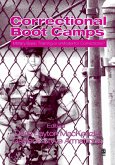Doris L. MacKenzie, Gaylene S. Armstrong
Correctional Boot Camps
: Military Basic Training or a Model for Corrections?
Doris L. MacKenzie, Gaylene S. Armstrong
Correctional Boot Camps
: Military Basic Training or a Model for Corrections?
- Gebundenes Buch
- Merkliste
- Auf die Merkliste
- Bewerten Bewerten
- Teilen
- Produkt teilen
- Produkterinnerung
- Produkterinnerung
Correctional Boot Camps: Military Basic Training or a Model for Corrections? provides the most up-to-date assessment of the major perspectives and issues related to the current state of boot camps. The book goes beyond cursory examinations of the effectiveness of boot camps, presenting an in-depth view of a greater variety of issues. Correctional Boot Camps examines empirical evidence on boot camps drawn from diverse sources including male, female, juvenile, and adult programs from across the nation.
Andere Kunden interessierten sich auch für
![Correctional Boot Camps Correctional Boot Camps]() Doris L. MacKenzieCorrectional Boot Camps141,99 €
Doris L. MacKenzieCorrectional Boot Camps141,99 €![Choosing Correctional Options That Work Choosing Correctional Options That Work]() Alan T. HarlandChoosing Correctional Options That Work105,99 €
Alan T. HarlandChoosing Correctional Options That Work105,99 €![Choosing Correctional Options That Work Choosing Correctional Options That Work]() Alan T. HarlandChoosing Correctional Options That Work165,99 €
Alan T. HarlandChoosing Correctional Options That Work165,99 €![Correctional Mental Health Handbook Correctional Mental Health Handbook]() Thomas J FaganCorrectional Mental Health Handbook239,99 €
Thomas J FaganCorrectional Mental Health Handbook239,99 €![Correctional Mental Health Correctional Mental Health]() Thomas J. FaganCorrectional Mental Health165,99 €
Thomas J. FaganCorrectional Mental Health165,99 €![Racialized Correctional Governance Racialized Correctional Governance]() Claire SpivakovskyRacialized Correctional Governance79,99 €
Claire SpivakovskyRacialized Correctional Governance79,99 €![Practice Innovation in Pollsmoor Correctional Facility Practice Innovation in Pollsmoor Correctional Facility]() Dannyboy PietersePractice Innovation in Pollsmoor Correctional Facility44,99 €
Dannyboy PietersePractice Innovation in Pollsmoor Correctional Facility44,99 €-
-
-
Correctional Boot Camps: Military Basic Training or a Model for Corrections? provides the most up-to-date assessment of the major perspectives and issues related to the current state of boot camps. The book goes beyond cursory examinations of the effectiveness of boot camps, presenting an in-depth view of a greater variety of issues. Correctional Boot Camps examines empirical evidence on boot camps drawn from diverse sources including male, female, juvenile, and adult programs from across the nation.
Hinweis: Dieser Artikel kann nur an eine deutsche Lieferadresse ausgeliefert werden.
Hinweis: Dieser Artikel kann nur an eine deutsche Lieferadresse ausgeliefert werden.
Produktdetails
- Produktdetails
- Verlag: Sage Publications, Inc
- Seitenzahl: 352
- Erscheinungstermin: 27. Februar 2004
- Englisch
- Abmessung: 260mm x 183mm x 23mm
- Gewicht: 857g
- ISBN-13: 9780761929383
- ISBN-10: 076192938X
- Artikelnr.: 22207841
- Herstellerkennzeichnung
- Libri GmbH
- Europaallee 1
- 36244 Bad Hersfeld
- gpsr@libri.de
- Verlag: Sage Publications, Inc
- Seitenzahl: 352
- Erscheinungstermin: 27. Februar 2004
- Englisch
- Abmessung: 260mm x 183mm x 23mm
- Gewicht: 857g
- ISBN-13: 9780761929383
- ISBN-10: 076192938X
- Artikelnr.: 22207841
- Herstellerkennzeichnung
- Libri GmbH
- Europaallee 1
- 36244 Bad Hersfeld
- gpsr@libri.de
Gaylene Styve Armstrong, Ph.D., is an Assistant Professor in the Department of Criminal Justice and Criminology at Arizona State University West. She obtained her doctorate in criminology and criminal justice from the University of Maryland. Her research has focused on corrections, juvenile delinquency, and applied statistical modeling. She was principal investigator on grant funded by the National Institute of Justice that examined the effects of privatization on environmental quality in juvenile correctional facilities. This research on privatization resulted in a book titled Private vs. Public Operation of Juvenile Correctional Facilities . Some of her other recent research can also be found in Crime and Delinquency, Justice Quarterly and Journal of Research on Crime and Delinquency . Recently, Armstrong was nominated for the Carnegie Foundations U.S. Professor of the Year Award for her excellence in teaching.
Doris Layton MacKenzie, Ph.D., is Professor in the Department of Criminology and Criminal Justice at the University of Maryland and Director of the Evaluation Research Group. Prior to this position, she earned her doctorate from Pennsylvania State University, was on the faculty of the Louisiana State University where she was honored as a Researcher of Distinction, and was awarded a Visiting Scientist position at the National Institute of Justice. As Visiting Scientist, she provided expertise to Federal, State and Local jurisdictions on correctional boot camps, correctional policy, intermediate sanctions, research methodology, experimental design, statistical analyses, and evaluation techniques. As an expert in criminal justice, Dr. MacKenzie has consulted with State and Local jurisdictions, and has testified before U.S. Senate and House Committees. She has an extensive publication record on such topics as examining what works to reduce crime in the community, inmate adjustment to prison, the impact of intermediate sanctions on recidivism, long-term offenders, methods of predicting prison populations, self-report criminal activities of probationers and boot camp prisons. She directed funded research projects on the topics of: Multi-Site Study of Correctional Boot Camps, Descriptive Study of Female Boot Camps, Probationer Compliance with Conditions of Supervision and The National Study of Juvenile Correctional Institutions and What Works in Corrections. Dr. MacKenzie is Past-Chair of the American Society of Criminology's Division on Corrections and Sentencing.
Doris Layton MacKenzie, Ph.D., is Professor in the Department of Criminology and Criminal Justice at the University of Maryland and Director of the Evaluation Research Group. Prior to this position, she earned her doctorate from Pennsylvania State University, was on the faculty of the Louisiana State University where she was honored as a Researcher of Distinction, and was awarded a Visiting Scientist position at the National Institute of Justice. As Visiting Scientist, she provided expertise to Federal, State and Local jurisdictions on correctional boot camps, correctional policy, intermediate sanctions, research methodology, experimental design, statistical analyses, and evaluation techniques. As an expert in criminal justice, Dr. MacKenzie has consulted with State and Local jurisdictions, and has testified before U.S. Senate and House Committees. She has an extensive publication record on such topics as examining what works to reduce crime in the community, inmate adjustment to prison, the impact of intermediate sanctions on recidivism, long-term offenders, methods of predicting prison populations, self-report criminal activities of probationers and boot camp prisons. She directed funded research projects on the topics of: Multi-Site Study of Correctional Boot Camps, Descriptive Study of Female Boot Camps, Probationer Compliance with Conditions of Supervision and The National Study of Juvenile Correctional Institutions and What Works in Corrections. Dr. MacKenzie is Past-Chair of the American Society of Criminology's Division on Corrections and Sentencing.is Professor in the Department of Criminology and Criminal Justice at the University of Maryland and Director of the Evaluation Research Group. Prior to this position, she earned her doctorate from Pennsylvania State University, was on the faculty of the Louisiana State University where she was honored as a Researcher of Distinction, and was awarded a Visiting Scientist position at the National Institute of Justice. As Visiting Scientist, she provided expertise to Federal, State and Local jurisdictions on correctional boot camps, correctional policy, intermediate sanctions, research methodology, experimental design, statistical analyses, and evaluation techniques. As an expert in criminal justice, Dr. MacKenzie has consulted with State and Local jurisdictions, and has testified before U.S. Senate and House Committees. She has an extensive publication record on such topics as examining what works to reduce crime in the community, inmate adjustment to prison, the impact of intermediate sanctions on recidivism, long-term offenders, methods of predicting prison populations, self-report criminal activities of probationers and boot camp prisons. She directed funded research projects on the topics of: Multi-Site Study of Correctional Boot Camps, Descriptive Study of Female Boot Camps, Probationer Compliance with Conditions of Supervision and The National Study of Juvenile Correctional Institutions and What Works in Corrections. Dr. MacKenzie is Past-Chair of the American Society of Criminology's Division on Corrections and Sentencing.
Doris Layton MacKenzie, Ph.D., is Professor in the Department of Criminology and Criminal Justice at the University of Maryland and Director of the Evaluation Research Group. Prior to this position, she earned her doctorate from Pennsylvania State University, was on the faculty of the Louisiana State University where she was honored as a Researcher of Distinction, and was awarded a Visiting Scientist position at the National Institute of Justice. As Visiting Scientist, she provided expertise to Federal, State and Local jurisdictions on correctional boot camps, correctional policy, intermediate sanctions, research methodology, experimental design, statistical analyses, and evaluation techniques. As an expert in criminal justice, Dr. MacKenzie has consulted with State and Local jurisdictions, and has testified before U.S. Senate and House Committees. She has an extensive publication record on such topics as examining what works to reduce crime in the community, inmate adjustment to prison, the impact of intermediate sanctions on recidivism, long-term offenders, methods of predicting prison populations, self-report criminal activities of probationers and boot camp prisons. She directed funded research projects on the topics of: Multi-Site Study of Correctional Boot Camps, Descriptive Study of Female Boot Camps, Probationer Compliance with Conditions of Supervision and The National Study of Juvenile Correctional Institutions and What Works in Corrections. Dr. MacKenzie is Past-Chair of the American Society of Criminology's Division on Corrections and Sentencing.
Doris Layton MacKenzie, Ph.D., is Professor in the Department of Criminology and Criminal Justice at the University of Maryland and Director of the Evaluation Research Group. Prior to this position, she earned her doctorate from Pennsylvania State University, was on the faculty of the Louisiana State University where she was honored as a Researcher of Distinction, and was awarded a Visiting Scientist position at the National Institute of Justice. As Visiting Scientist, she provided expertise to Federal, State and Local jurisdictions on correctional boot camps, correctional policy, intermediate sanctions, research methodology, experimental design, statistical analyses, and evaluation techniques. As an expert in criminal justice, Dr. MacKenzie has consulted with State and Local jurisdictions, and has testified before U.S. Senate and House Committees. She has an extensive publication record on such topics as examining what works to reduce crime in the community, inmate adjustment to prison, the impact of intermediate sanctions on recidivism, long-term offenders, methods of predicting prison populations, self-report criminal activities of probationers and boot camp prisons. She directed funded research projects on the topics of: Multi-Site Study of Correctional Boot Camps, Descriptive Study of Female Boot Camps, Probationer Compliance with Conditions of Supervision and The National Study of Juvenile Correctional Institutions and What Works in Corrections. Dr. MacKenzie is Past-Chair of the American Society of Criminology's Division on Corrections and Sentencing.is Professor in the Department of Criminology and Criminal Justice at the University of Maryland and Director of the Evaluation Research Group. Prior to this position, she earned her doctorate from Pennsylvania State University, was on the faculty of the Louisiana State University where she was honored as a Researcher of Distinction, and was awarded a Visiting Scientist position at the National Institute of Justice. As Visiting Scientist, she provided expertise to Federal, State and Local jurisdictions on correctional boot camps, correctional policy, intermediate sanctions, research methodology, experimental design, statistical analyses, and evaluation techniques. As an expert in criminal justice, Dr. MacKenzie has consulted with State and Local jurisdictions, and has testified before U.S. Senate and House Committees. She has an extensive publication record on such topics as examining what works to reduce crime in the community, inmate adjustment to prison, the impact of intermediate sanctions on recidivism, long-term offenders, methods of predicting prison populations, self-report criminal activities of probationers and boot camp prisons. She directed funded research projects on the topics of: Multi-Site Study of Correctional Boot Camps, Descriptive Study of Female Boot Camps, Probationer Compliance with Conditions of Supervision and The National Study of Juvenile Correctional Institutions and What Works in Corrections. Dr. MacKenzie is Past-Chair of the American Society of Criminology's Division on Corrections and Sentencing.
Chapter 01. Introduction. - D.L. MacKenzie
SECTION I: THE BOOT CAMP MODEL
Chapter 02. Boot Camps as a Correctional Option. - G.S. Armstrong
Chapter 03: Boot Camp Prisons for Young Offenders - D. L. MacKenzie & D. G.
Parent
Chapter 04. Correctional Boot Camps for Juveniles. - D. L. MacKenzie & A.
Rosay
SECTION II: THE DEBATE ABOUT BOOT CAMPS
Chapter 05. Shock incarceration: Rehabilitation or retribution? - D.L.
MacKenzie, L. A. Gould, L. M. Riechers & J. W. Shaw
Chapter 06. A "Machiavellian" perspective on the development of boot camp
prisons: A debate. - D. L. MacKenzie & C. Souryal
SECTION III: THE ENVIRONMENT OF BOOT CAMPS
Chapter 07. Performance Based Standards for Juvenile Corrections - D. L.
MacKenzie, G. J. Styve, and A. Gover
Chapter 08. Perceived Conditions of Confinement: A National Evaluation of
Boot Camps and Traditional Facilities - G. J. Styvey, D. L. MacKenzie, A.
R. Gover, and O. Mitchell
Chapter 09. Boot Camps and Traditional Correctional Facilities for
Juveniles: A Comparison of the Participants, Daily Activities and
Environments - A. R. Gover, D. L. MacKenzie, and G. Styve
Chapter 10. The Environment and Working Conditions in Juvenile Boot Camps
and Traditional Facilities - O. Mitchell, D. L. MacKenzie, A. R. Gover, and
G. J. Styve
SECTION IV. Inmate Adjustment and Change during Incarceration
Chapter 11: The Impact of Boot Camps and Traditional Institutions on
Juvenile Residents: Perceptions, Adjustment, and Change - D. L. MacKenzie,
D. B. Wilson, G. S. Armstrong, and A. R. Gover
Chapter 12. Inmate Attitude Change During Incarceration: A Comparison of
Boot Camp with Traditional Prison - D. L. MacKenzie and C. Souryal
SECTION V. Impact on Future Criminal Activities
Chapter 13. Boot Camp Prisons and Recidivism in Eight States - D. L.
MacKenzie, R. Brame, D. JcDowall, and C. Souryal
Chapter 14. Effects of Correctional Boot Camps on Offending - D. L.
MacKenzie, D. B. Wilson, and S. B. Kider
SECTION VI. Adjustment in the Community
Chapter 15. Shock Incarceration and Positive Adjustment during Community
Supervision - D. L. MacKenzie and R. Brame
Chapter 16. Characteristics Associated with Successful Adjustment to
Supervision - D. L. MacKenzie, J. W. Shaw, and C. Souryal
SECTION VII. Special Offender Populations in Boot Camps
Chapter 17. Boot Camp Prisons for Women Offenders - D. L. MacKenzie and H.
Donaldson
Chapter 18. Shock Incarceration and Its Impact on the Lives of Problem
Drinkers - J. S. Shaw and D. L. MacKenzie
Chapter 19. The One-Year Community Supervision Performance of Drug
Offenders and Louisiana DOC-Identified Substance Abusers Graduation from
Shock Incarceration - J. W. Shaw and D. L. MacKenzie
SECTION VIII. System Level Impacts
Chapter 20. The Impact of Shock Incarceration Programs on Prison Crowding -
D. L. MacKenzie and A. Piquero
SECTION IX. The Future
Chapter 21. Where Do We Go From Here? - D.L. MacKenzie and G. S. Armstrong
SECTION I: THE BOOT CAMP MODEL
Chapter 02. Boot Camps as a Correctional Option. - G.S. Armstrong
Chapter 03: Boot Camp Prisons for Young Offenders - D. L. MacKenzie & D. G.
Parent
Chapter 04. Correctional Boot Camps for Juveniles. - D. L. MacKenzie & A.
Rosay
SECTION II: THE DEBATE ABOUT BOOT CAMPS
Chapter 05. Shock incarceration: Rehabilitation or retribution? - D.L.
MacKenzie, L. A. Gould, L. M. Riechers & J. W. Shaw
Chapter 06. A "Machiavellian" perspective on the development of boot camp
prisons: A debate. - D. L. MacKenzie & C. Souryal
SECTION III: THE ENVIRONMENT OF BOOT CAMPS
Chapter 07. Performance Based Standards for Juvenile Corrections - D. L.
MacKenzie, G. J. Styve, and A. Gover
Chapter 08. Perceived Conditions of Confinement: A National Evaluation of
Boot Camps and Traditional Facilities - G. J. Styvey, D. L. MacKenzie, A.
R. Gover, and O. Mitchell
Chapter 09. Boot Camps and Traditional Correctional Facilities for
Juveniles: A Comparison of the Participants, Daily Activities and
Environments - A. R. Gover, D. L. MacKenzie, and G. Styve
Chapter 10. The Environment and Working Conditions in Juvenile Boot Camps
and Traditional Facilities - O. Mitchell, D. L. MacKenzie, A. R. Gover, and
G. J. Styve
SECTION IV. Inmate Adjustment and Change during Incarceration
Chapter 11: The Impact of Boot Camps and Traditional Institutions on
Juvenile Residents: Perceptions, Adjustment, and Change - D. L. MacKenzie,
D. B. Wilson, G. S. Armstrong, and A. R. Gover
Chapter 12. Inmate Attitude Change During Incarceration: A Comparison of
Boot Camp with Traditional Prison - D. L. MacKenzie and C. Souryal
SECTION V. Impact on Future Criminal Activities
Chapter 13. Boot Camp Prisons and Recidivism in Eight States - D. L.
MacKenzie, R. Brame, D. JcDowall, and C. Souryal
Chapter 14. Effects of Correctional Boot Camps on Offending - D. L.
MacKenzie, D. B. Wilson, and S. B. Kider
SECTION VI. Adjustment in the Community
Chapter 15. Shock Incarceration and Positive Adjustment during Community
Supervision - D. L. MacKenzie and R. Brame
Chapter 16. Characteristics Associated with Successful Adjustment to
Supervision - D. L. MacKenzie, J. W. Shaw, and C. Souryal
SECTION VII. Special Offender Populations in Boot Camps
Chapter 17. Boot Camp Prisons for Women Offenders - D. L. MacKenzie and H.
Donaldson
Chapter 18. Shock Incarceration and Its Impact on the Lives of Problem
Drinkers - J. S. Shaw and D. L. MacKenzie
Chapter 19. The One-Year Community Supervision Performance of Drug
Offenders and Louisiana DOC-Identified Substance Abusers Graduation from
Shock Incarceration - J. W. Shaw and D. L. MacKenzie
SECTION VIII. System Level Impacts
Chapter 20. The Impact of Shock Incarceration Programs on Prison Crowding -
D. L. MacKenzie and A. Piquero
SECTION IX. The Future
Chapter 21. Where Do We Go From Here? - D.L. MacKenzie and G. S. Armstrong
Chapter 01. Introduction. - D.L. MacKenzie
SECTION I: THE BOOT CAMP MODEL
Chapter 02. Boot Camps as a Correctional Option. - G.S. Armstrong
Chapter 03: Boot Camp Prisons for Young Offenders - D. L. MacKenzie & D. G.
Parent
Chapter 04. Correctional Boot Camps for Juveniles. - D. L. MacKenzie & A.
Rosay
SECTION II: THE DEBATE ABOUT BOOT CAMPS
Chapter 05. Shock incarceration: Rehabilitation or retribution? - D.L.
MacKenzie, L. A. Gould, L. M. Riechers & J. W. Shaw
Chapter 06. A "Machiavellian" perspective on the development of boot camp
prisons: A debate. - D. L. MacKenzie & C. Souryal
SECTION III: THE ENVIRONMENT OF BOOT CAMPS
Chapter 07. Performance Based Standards for Juvenile Corrections - D. L.
MacKenzie, G. J. Styve, and A. Gover
Chapter 08. Perceived Conditions of Confinement: A National Evaluation of
Boot Camps and Traditional Facilities - G. J. Styvey, D. L. MacKenzie, A.
R. Gover, and O. Mitchell
Chapter 09. Boot Camps and Traditional Correctional Facilities for
Juveniles: A Comparison of the Participants, Daily Activities and
Environments - A. R. Gover, D. L. MacKenzie, and G. Styve
Chapter 10. The Environment and Working Conditions in Juvenile Boot Camps
and Traditional Facilities - O. Mitchell, D. L. MacKenzie, A. R. Gover, and
G. J. Styve
SECTION IV. Inmate Adjustment and Change during Incarceration
Chapter 11: The Impact of Boot Camps and Traditional Institutions on
Juvenile Residents: Perceptions, Adjustment, and Change - D. L. MacKenzie,
D. B. Wilson, G. S. Armstrong, and A. R. Gover
Chapter 12. Inmate Attitude Change During Incarceration: A Comparison of
Boot Camp with Traditional Prison - D. L. MacKenzie and C. Souryal
SECTION V. Impact on Future Criminal Activities
Chapter 13. Boot Camp Prisons and Recidivism in Eight States - D. L.
MacKenzie, R. Brame, D. JcDowall, and C. Souryal
Chapter 14. Effects of Correctional Boot Camps on Offending - D. L.
MacKenzie, D. B. Wilson, and S. B. Kider
SECTION VI. Adjustment in the Community
Chapter 15. Shock Incarceration and Positive Adjustment during Community
Supervision - D. L. MacKenzie and R. Brame
Chapter 16. Characteristics Associated with Successful Adjustment to
Supervision - D. L. MacKenzie, J. W. Shaw, and C. Souryal
SECTION VII. Special Offender Populations in Boot Camps
Chapter 17. Boot Camp Prisons for Women Offenders - D. L. MacKenzie and H.
Donaldson
Chapter 18. Shock Incarceration and Its Impact on the Lives of Problem
Drinkers - J. S. Shaw and D. L. MacKenzie
Chapter 19. The One-Year Community Supervision Performance of Drug
Offenders and Louisiana DOC-Identified Substance Abusers Graduation from
Shock Incarceration - J. W. Shaw and D. L. MacKenzie
SECTION VIII. System Level Impacts
Chapter 20. The Impact of Shock Incarceration Programs on Prison Crowding -
D. L. MacKenzie and A. Piquero
SECTION IX. The Future
Chapter 21. Where Do We Go From Here? - D.L. MacKenzie and G. S. Armstrong
SECTION I: THE BOOT CAMP MODEL
Chapter 02. Boot Camps as a Correctional Option. - G.S. Armstrong
Chapter 03: Boot Camp Prisons for Young Offenders - D. L. MacKenzie & D. G.
Parent
Chapter 04. Correctional Boot Camps for Juveniles. - D. L. MacKenzie & A.
Rosay
SECTION II: THE DEBATE ABOUT BOOT CAMPS
Chapter 05. Shock incarceration: Rehabilitation or retribution? - D.L.
MacKenzie, L. A. Gould, L. M. Riechers & J. W. Shaw
Chapter 06. A "Machiavellian" perspective on the development of boot camp
prisons: A debate. - D. L. MacKenzie & C. Souryal
SECTION III: THE ENVIRONMENT OF BOOT CAMPS
Chapter 07. Performance Based Standards for Juvenile Corrections - D. L.
MacKenzie, G. J. Styve, and A. Gover
Chapter 08. Perceived Conditions of Confinement: A National Evaluation of
Boot Camps and Traditional Facilities - G. J. Styvey, D. L. MacKenzie, A.
R. Gover, and O. Mitchell
Chapter 09. Boot Camps and Traditional Correctional Facilities for
Juveniles: A Comparison of the Participants, Daily Activities and
Environments - A. R. Gover, D. L. MacKenzie, and G. Styve
Chapter 10. The Environment and Working Conditions in Juvenile Boot Camps
and Traditional Facilities - O. Mitchell, D. L. MacKenzie, A. R. Gover, and
G. J. Styve
SECTION IV. Inmate Adjustment and Change during Incarceration
Chapter 11: The Impact of Boot Camps and Traditional Institutions on
Juvenile Residents: Perceptions, Adjustment, and Change - D. L. MacKenzie,
D. B. Wilson, G. S. Armstrong, and A. R. Gover
Chapter 12. Inmate Attitude Change During Incarceration: A Comparison of
Boot Camp with Traditional Prison - D. L. MacKenzie and C. Souryal
SECTION V. Impact on Future Criminal Activities
Chapter 13. Boot Camp Prisons and Recidivism in Eight States - D. L.
MacKenzie, R. Brame, D. JcDowall, and C. Souryal
Chapter 14. Effects of Correctional Boot Camps on Offending - D. L.
MacKenzie, D. B. Wilson, and S. B. Kider
SECTION VI. Adjustment in the Community
Chapter 15. Shock Incarceration and Positive Adjustment during Community
Supervision - D. L. MacKenzie and R. Brame
Chapter 16. Characteristics Associated with Successful Adjustment to
Supervision - D. L. MacKenzie, J. W. Shaw, and C. Souryal
SECTION VII. Special Offender Populations in Boot Camps
Chapter 17. Boot Camp Prisons for Women Offenders - D. L. MacKenzie and H.
Donaldson
Chapter 18. Shock Incarceration and Its Impact on the Lives of Problem
Drinkers - J. S. Shaw and D. L. MacKenzie
Chapter 19. The One-Year Community Supervision Performance of Drug
Offenders and Louisiana DOC-Identified Substance Abusers Graduation from
Shock Incarceration - J. W. Shaw and D. L. MacKenzie
SECTION VIII. System Level Impacts
Chapter 20. The Impact of Shock Incarceration Programs on Prison Crowding -
D. L. MacKenzie and A. Piquero
SECTION IX. The Future
Chapter 21. Where Do We Go From Here? - D.L. MacKenzie and G. S. Armstrong








